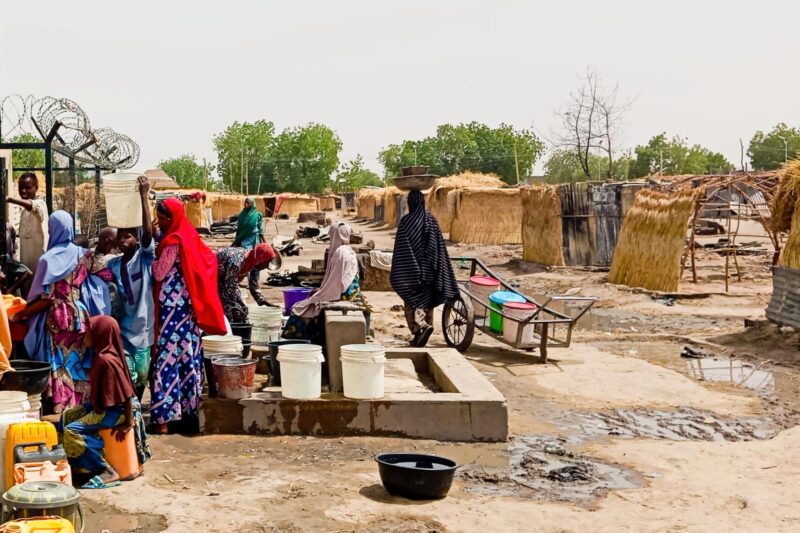Post-traumatic stress disorder, depression, anxiety, feelings of isolation and hopelessness are common among displaced people and need to be addressed before vulnerable individuals can become self-reliant.
The devastating effects of conflict and violence on the mental health of internally displaced persons (IDPs) in Borno State – the epicentre of the 15-year insurgency – need to be addressed to help vulnerable individuals become more self-reliant.
Too often, food, water and shelter are defined as the sole primary needs. But displaced people experience grief, loss of economic opportunities and a sense of self, a breakdown of cultural identity and family structures – and they have little to no access to adequate healthcare or education.
These socioeconomic stressors put an immense strain on mental health, said Umar Abubakar Jiddari, who works for Nigeria’s Red Cross Society in Maiduguri, the state capital.
As a mental health and psychosocial support officer, he said in his experience almost all displaced people needed some form of psychological support.
“The trauma displaced people have lived through is immeasurable. And each person deals with that kind of stress differently.
“The Borno State government wants displaced people to become less reliant on help from humanitarian agencies but to become self-reliant, they need psychosocial support.”
An estimated 3.2 million people have been displaced in the state since the start of the insurgency in 2009. More than 350,000 people have been killed and at least 100,000 children are now orphans.
Jiddari said extreme violence had a devastating effect on the mental health of displaced people who had witnessed the deaths of loved ones.
Apart from enduring perilous escapes from assailants, they ended up living in desperately poor conditions and were unable to do much to change their circumstances, not only because of poverty but also because of mental trauma.
Post-traumatic stress disorder, depression, anxiety, feelings of isolation and hopelessness were common, he said.
Women and girls – often forced to become the heads of families – were exposed to heightened levels of sexual and gender-based violence, including assault, abuse, early and forced marriage and sexual exploitation.
Family and other social structures had been broken. Displaced people experienced trauma and a sense of loss regarding their identity. Prolonged displacement also led to anxiety about their future.
In many cases, children lost both parents and had to provide for themselves and their siblings.
“Even when displaced people are being resettled in their ancestral homes, they are anxious because they fear the conflicts still persist. They don’t see an end in sight.”
Jiddari said it was easy for IDPs to become reliant on humanitarian agencies, the government and philanthropists to survive.
Displaced people had lost their sources of income, which affected their wellbeing and lowered their self-confidence.
“The displacement of communities, coupled with the trauma of conflict and violence, has led to a heightened demand for mental health support.
“Solutions should focus on empowering IDPs with opportunities to earn a livelihood to make them less dependent on aid.
“Mental healthcare is imperative to help change the state of mind of displaced people. Instead of giving up because they no longer receive as much humanitarian aid as they did in previous years, they need to find ways to become self-reliant.
“But they can only become self-reliant if they are mentally equipped – or at least taught ways to overcome their mental distress. Mental healthcare needs to be scaled up.
“With the help and guidance of a psychologist, people with mental problems are encouraged to speak out about their feelings. They need to express their anxieties. They need to be taught ways to deal with their bottled-up emotions of fear, sadness, inadequateness.
“They need to learn that it is natural to feel so distressed after what they have experienced and that there are ways to deal with it.
“If they are taught methods that help them to cope, they will be able to change their mindset. There will be a shift in the way they think. They will appreciate the need to become more self-reliant.
“One of the problems is that there are not sufficient mental health facilities or practitioners. Primary healthcare workers need to be trained to provide basic mental health support.
“Healthcare workers must be equipped with skills to provide basic counselling, reduce stigma and raise awareness about acute stress disorder, post-traumatic stress disorder and other significant emotional complaints.
“They must be capable of offering care and treatment to patients with moderate to severe depression, self-harm or suicidal tendencies, dementia and alcohol and drug use disorders.”
“Displaced people have a lot of hardships and challenges resulting from their experiences during the insurgency. The government and healthcare agencies need to provide psychosocial support to encourage self-reliance and to change their state of mind.”
Yusuf Sa’id Bello, a displaced person in Maiduguri, said: “We used to receive regular humanitarian aid but now that has dried up. It’s difficult because we cannot start businesses – we don’t have the know-how or the capital.
“Living like this makes us feel inadequate because we cannot provide for our families. Some people have resorted to begging because it’s the only way to get something to eat.”
Fatima Ali is also a displaced person. She has been living in a community camp in Maiduguri for seven years.
“Before we were displaced, most of us were farmers. Some people fished. Some had small businesses. It was not always easy but we managed to make a living.
“We were forced to flee from our ancestral homes because of attacks by insurgents. Now we are jobless. We cannot farm. We just stay in the camp. We cannot support ourselves.”
SHETTIMA LAWAN MONGUNO








